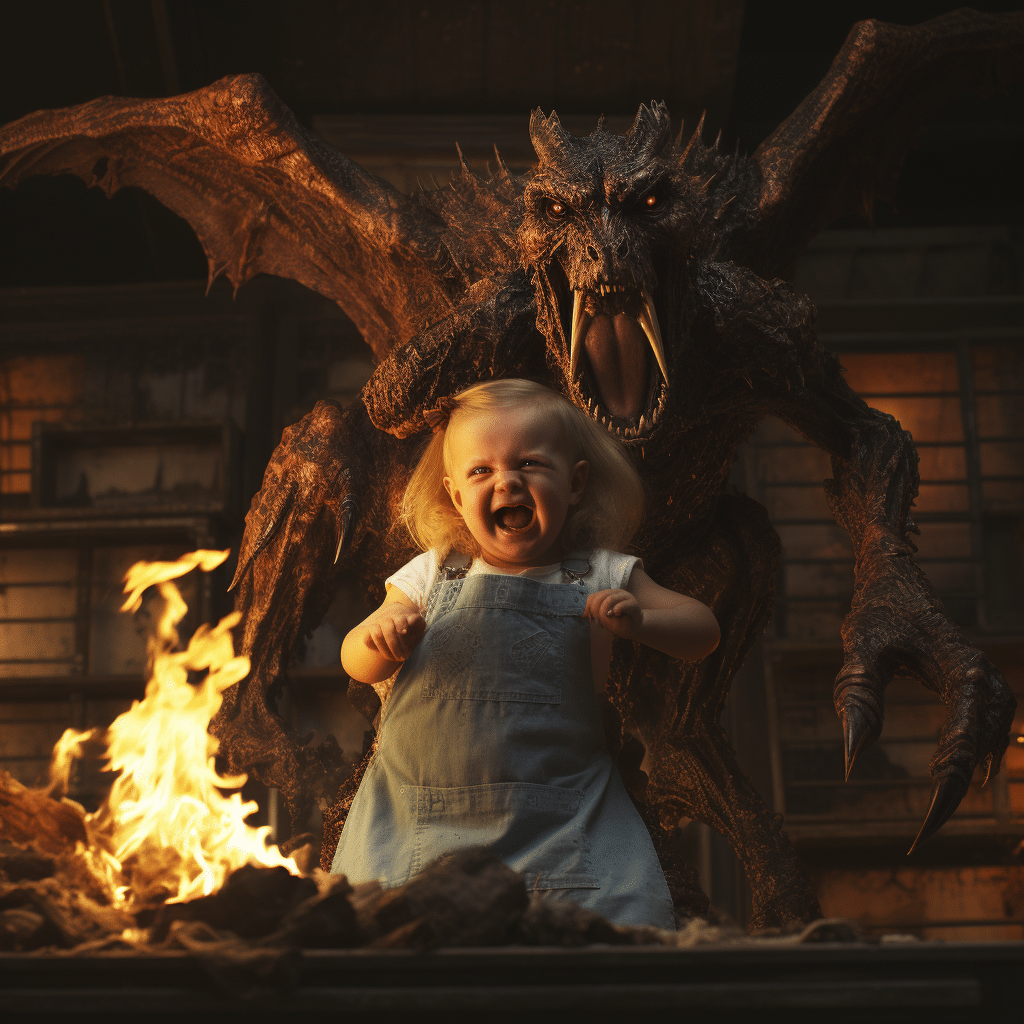The question “do babies go to hell” has been one of the most daunting and heart-wrenching dilemmas parents and theologians have grappled with throughout history. It is a topic that transcends mere academic debate, touching the very core of our spiritual beliefs and human compassion. At MothersAgainstAddiction.org, where we offer organization support to parents navigating the challenging waters of children’s addictions, or mourning losses that cut deep, this question is not hypothetical. It is intensely personal, as it reflects the fear of a potentially lost innocent soul.
Theological Debate: Do Babies Go to Hell According to Prominent Religions
The teachings of the world’s major religions differ vastly when it comes to the fate of our youngest souls. The complexity is not just between religions, but within them as well.
Strike up a conversation with a local priest, and you might hear echoes of the Catholic Church in Paducah, KY, emphasizing the mercy and love of God rather than an archaic notion of automatic damnation.

Case Studies: Historical Perspectives on Infant Mortality and the Afterlife
Throughout history, various societies have pondered the fate of infants who never had the chance to grow and make conscious decisions.
| Point of Discussion | Catholicism (Traditional) | Catholicism (Modern) | Protestantism | Other Considerations |
| Doctrine on Original Sin | Baptism is required to cleanse original sin. | Baptism remains significant but may not limit salvation. | Varied views on original sin; some denominations reject the concept. | Theological interpretations of sin and its effect on infants vary. |
| Fate of Unbaptized Babies | Historically, taught they reside in Limbo. | No official doctrine on Limbo; hope placed in God’s mercy. | Generally believe in God’s mercy for infants. | Beliefs about the afterlife and the age of accountability are diverse. |
| Limbo (Hypothetical place) | Conceived as a state of natural happiness without the beatific vision. | The concept of Limbo is not officially taught. | Most denominations do not recognize Limbo. | Some theologians speculate on the fate of souls previously thought to be in Limbo. |
| Change in Church Doctrine (April 23, 2007) | Not applicable. | Indication that unbaptized babies may go to heaven. | Not applicable. | Theological reconsideration reflects evolving understanding of God’s mercy. |
| Scriptural Basis | Not directly referenced; traditional interpretations of original sin. | Psalms 127:3-5; Matthew 18:10 signify God’s care for children. | Various scriptural interpretations; some emphasize Matthew 18:10 and similar verses. | Scripture is interpreted differently across denominations and faith traditions. |
| Age of Accountability | Not specifically defined; baptism as soon as possible. | Catechism mentions age of reason, around seven years old. | Varied; some specifically mention age eight or upon profession of faith. | The concept is tied to a child’s ability to understand morality and make conscious decisions. |
| Public Opinion and Sentiment | Historically, Limbo may have been distressing for parents. | More hopeful, compassionate view is a comfort to grieving parents. | Emphasis on individual faith and salvation through Christ alone. | Beliefs are influenced by cultural, historical, and personal factors. |
The Philosophy Behind Innocence: Do Babies Deserve Hell?
The concept of original sin vs. innocence prompts intense debate.

Contemporary Views and Controversies
The ancient beliefs are now placed under the microscope of contemporary thought.
Personal Stories: When Babies Go to Heaven Do They Stay Babies?
Heartrending stories from parents provide a personal touch to this profound subject.
Progressive Theology: Rethinking the Fate of Infants
Theological thought is ever-evolving, with fresh perspectives continually emerging about the afterlife and the place of children within it.
Conclusion: Embracing Complexity in the Face of the Unknown
In closing, perspectives on the fate of infants in the afterlife are diverse and deeply entwined with our fundamental theological and philosophical convictions. While this discourse continues to evolve, what remains constant is the ineffable bond between parent and child and the unquenchable desire for their eternal peace and happiness. This issue remains an ongoing journey of faith, fraught with emotional and spiritual ramifications. It reminds us to approach these profound questions with humility, sensitivity, and an open heart, recognizing that the answers may lie far beyond our mortal reach.
Do Babies Go to Hell? Unpacking 5 Harrowing Views
When it comes to life’s big questions, “do babies go to hell” is one that can stir up quite the emotional storm. It’s a topic that’s loaded with opinions, beliefs, and, let’s be honest, a whole lot of dread. So, buckle up, grab your morning cup of joe, and let’s dive into this rather prickly subject with some trivia and interesting facts that might just leave you saying miaou with surprise!
The Innocent Purr-spective
First off, have you heard the one about babies and cats? Some say both are too innocent to know the difference between right and wrong. It’s like asking if a cat knows it’s breaking the “don’t scratch the sofa” commandment when it sharpens its claws on your beloved couch. If you chuckle and say they’re both just too darn cute to be sinful, then you’re not alone! It’s quite the “miaou” moment to think our little tykes and fuzzy felines might share common ground.
The Historical Take on Tiny Tots
Digging through history books, or should we say, prying open old coffin Nails, we find that perspectives on the fate of infants have been all over the place. It’s enough to make one’s head spin faster than a merry-go-round that’s lost its brakes. Different cultures and religions have tangoed with the concept in more ways than you can shake a stick at. Thank goodness we’ve evolved a bit since those days when people took a “coffin nails” approach to something as tender as this!
Stars Weigh In: From Christopher to Amy
Ever curious what celebs like christopher george and Amy Sedaris might think about such an otherworldly topic? Hollywood has never shied away from the big questions, throwing its two cents into the ring with films that tickle the mind and sometimes wrench the heart. While I can’t say for certain what these two think, I reckon even the stars ponder life’s mysteries, nestled so snugly in their glam cocoons.
The Church’s Two Cents
Guess what—the catholic church paducah ky has its own stance on the issue, a viewpoint that’s had its share of evolution over the years. It’s fair to say that they’ve not always been on the same page, but who can blame ’em? It’s tough subject matter, likely to cause more heated debates than a game of Monopoly with the in-laws.
A Direct Kick from Roja
Turning to Roja Directa, a bold move if there ever was one, we see that the question of babies and hell can hit as hard as a soccer player’s penalty kick in a tied World Cup match. But let’s not get offside here; the point is, this topic can stir up passions and spike heart rates much like watching the last few nail-biting minutes of a big game.
In conclusion, the question of “do babies go to hell” is as complex as a Rubik’s Cube bathed in motor oil—slippery and vexing. It’s the sort of topic that can make you squirm in your seat or furrow your brow in deep thought. But, at the end of the day, aren’t these the types of deep dives that make life oh-so-compelling? With opinions as varied as the colors of the rainbow, it’s safe to say this is one conversation that’s not going quiet anytime soon. So, what’s your take?

Do unbaptised babies go to heaven?
Boy, the topic of unbaptized babies and heaven sure gets folks riled up! But here’s the thing – many believe heaven’s gates swing wide open for all little ones, unbaptized or not because they’re innocent and free from sin. So breathe easy – the consensus is, they’re in good hands up there.
What does God say about babies?
When it comes to little tykes, God’s got a soft spot. The Bible paints a pretty clear picture that He adores them, saying they’re a gift from the good Lord himself – pure and precious in His sight. It’s like, they’ve got a VIP pass straight to His heart!
At what age does a child become accountable to God?
Now, the age of accountability—that’s a hot potato! It’s not one-size-fits-all, and the Bible doesn’t give us a magic number. Basically, when kids know right from wrong and can chew over their choices, that’s when they’re on the hook for their actions. But until then, they’re under the radar.
What does the Bible say about children going to heaven?
The Bible is full of warm fuzzies about children and heaven. It’s pretty clear that kiddos have a special place up there. The verses suggest that their innocence and purity give them a straight shot to the pearly gates. It’s like they’ve got a fast pass to meet the Big Guy.
Where did unbaptized babies go?
The whole unbaptized babies scenario used to be a real noodle-scratcher, with folks worried they’d be stuck in limbo. But, hang on! A lot of modern thinkers reckon that’s old hat and that a loving God wouldn’t leave them hanging. So, they believe these little ones are chilling in heaven.
Why not to baptize babies?
Some folks argue, “Why rush to baptize babies?” since they’re not old enough to understand faith and make the choice themselves. It’s all about waiting until the kiddo can take the plunge on their own terms, getting dipped with a full deck.
What Jesus says about babies?
Jesus had a soft spot for little ones. He’d say, “Let the kiddos come to me, and don’t get in their way!” Basically, if they’re good enough for Jesus to hang out with, they must be something special.
Why did God create babies?
Want to know why God whipped up babies? It’s like He’s sending a bundle of joy and potential into the world – a fresh start and a reminder of His own creative power. Babies are like His own little DIY projects that show off His skills.
What does the Bible say about crying babies?
Crying babies in the Bible? You bet! Scriptures say it’s all part of the package – tiny lungs that preach a sermon of life and, let’s face it, the need for a diaper change. The Good Book doesn’t ignore the wails; it gets that it’s part of the circle of life.
Will God punish my children for my sins?
Worrying that your own wrongdoings will land on your kiddo’s shoulders? Nah, the Bible reassures us that everyone carries their own weight. Your mini-mes won’t pick up the tab for your slip-ups, so rest easy – it’s their own actions that count.
Is it possible for a child of God to sin?
Can a child of God sin? Well, hate to break it to you, but yep – having a golden ticket as His kiddo doesn’t mean you’re perfect. We’re all human, after all, prone to tripping up and skinning our knees on sin, but it’s all about getting back up and aiming higher.
At what age am I not responsible for my child?
That question of when you can wipe your hands clean of responsibility for your offsprings’ antics? It’s a tough one. Legally, it’s 18 in most places, but hey, let’s be real – they’re always your babies, and some part of you will always care like they’re still in footie pajamas.
Will I see my miscarried baby in heaven?
Losing a little one before meeting them is heartbreaking. Many believe that you’ll catch up with your miscarried baby in heaven like a raincheck for a future hug. It’s a comforting thought in a sea of sorrow, a silver lining on a very dark cloud.
What is the sin that cries out to heaven?
In the Bible, “the sin that cries out to heaven” gets the divine alarm bells ringing loud and clear. It’s usually serious stuff like murder or oppressing the weak – actions that don’t just whisper but holler for Heaven’s attention.
Where is God when a child suffers?
When you see a kiddo suffering, it can feel like God’s gone AWOL, right? But the faith crowd says He’s there, feeling every ouch and ache with them. It’s just that His GPS sometimes seems a bit off when you’re in the thick of it.
Do unbaptized babies have guardian angels?
Now, you might think unbaptized tots are out on their own, but many believe each bairn is watched over by guardian angels. It’s like heaven’s sent an undercover celestial babysitter, and not having been spritzed with holy water doesn’t change that.
What is the meaning of unbaptized babies?
Unbaptized babies – kinda sounds like they’ve missed out on a VIP party, eh? In a nutshell, it’s about those tiny tots who haven’t had the water-works ceremony of baptism. But worry not–lots think there’s a heavenly welcome mat rolled out for them, no RSVP needed.
What age does the Bible say to get baptized?
Looking for the right time to take the plunge? The Bible’s timeline on baptism isn’t about hitting a certain age, but more about being old enough to believe and dunk your own head with purpose. When you’re ready to dive into faith – that’s your time.
What religions do not baptize babies?
Not all folks agree on splish-splashing the newborns. Religions like Baptists and Pentecostals are more “hold your horses” and wait until the person can take a conscious leap of faith. It’s their way of saying, “You gotta walk before you can swim.”




























